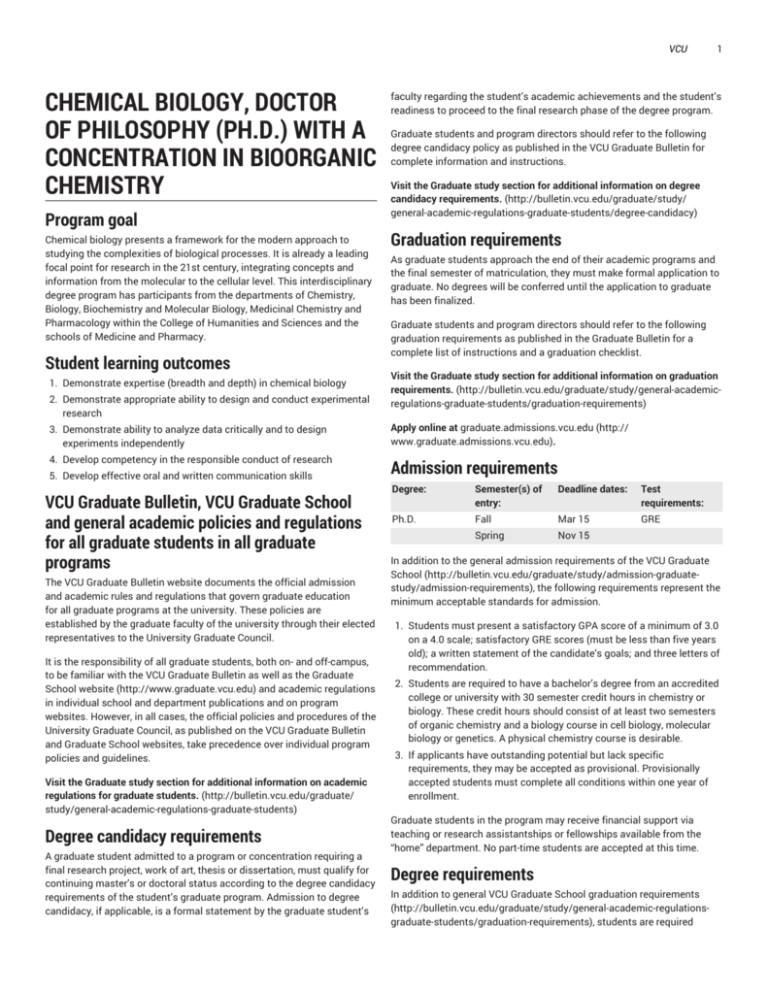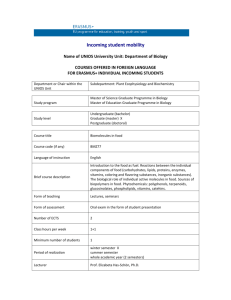CHEMICAL BIOLOGY, DOCTOR OF PHILOSOPHY
advertisement

VCU 1 CHEMICAL BIOLOGY, DOCTOR OF PHILOSOPHY (PH.D.) WITH A CONCENTRATION IN BIOORGANIC CHEMISTRY Program goal Chemical biology presents a framework for the modern approach to studying the complexities of biological processes. It is already a leading focal point for research in the 21st century, integrating concepts and information from the molecular to the cellular level. This interdisciplinary degree program has participants from the departments of Chemistry, Biology, Biochemistry and Molecular Biology, Medicinal Chemistry and Pharmacology within the College of Humanities and Sciences and the schools of Medicine and Pharmacy. Student learning outcomes 1. Demonstrate expertise (breadth and depth) in chemical biology 2. Demonstrate appropriate ability to design and conduct experimental research faculty regarding the student’s academic achievements and the student’s readiness to proceed to the final research phase of the degree program. Graduate students and program directors should refer to the following degree candidacy policy as published in the VCU Graduate Bulletin for complete information and instructions. Visit the Graduate study section for additional information on degree candidacy requirements. (http://bulletin.vcu.edu/graduate/study/ general-academic-regulations-graduate-students/degree-candidacy) Graduation requirements As graduate students approach the end of their academic programs and the final semester of matriculation, they must make formal application to graduate. No degrees will be conferred until the application to graduate has been finalized. Graduate students and program directors should refer to the following graduation requirements as published in the Graduate Bulletin for a complete list of instructions and a graduation checklist. Visit the Graduate study section for additional information on graduation requirements. (http://bulletin.vcu.edu/graduate/study/general-academicregulations-graduate-students/graduation-requirements) 3. Demonstrate ability to analyze data critically and to design experiments independently Apply online at graduate.admissions.vcu.edu (http:// www.graduate.admissions.vcu.edu). 4. Develop competency in the responsible conduct of research Admission requirements 5. Develop effective oral and written communication skills VCU Graduate Bulletin, VCU Graduate School and general academic policies and regulations for all graduate students in all graduate programs The VCU Graduate Bulletin website documents the official admission and academic rules and regulations that govern graduate education for all graduate programs at the university. These policies are established by the graduate faculty of the university through their elected representatives to the University Graduate Council. It is the responsibility of all graduate students, both on- and off-campus, to be familiar with the VCU Graduate Bulletin as well as the Graduate School website (http://www.graduate.vcu.edu) and academic regulations in individual school and department publications and on program websites. However, in all cases, the official policies and procedures of the University Graduate Council, as published on the VCU Graduate Bulletin and Graduate School websites, take precedence over individual program policies and guidelines. Visit the Graduate study section for additional information on academic regulations for graduate students. (http://bulletin.vcu.edu/graduate/ study/general-academic-regulations-graduate-students) Degree candidacy requirements A graduate student admitted to a program or concentration requiring a final research project, work of art, thesis or dissertation, must qualify for continuing master’s or doctoral status according to the degree candidacy requirements of the student’s graduate program. Admission to degree candidacy, if applicable, is a formal statement by the graduate student’s Degree: Semester(s) of entry: Deadline dates: Test requirements: Ph.D. Fall Mar 15 GRE Spring Nov 15 In addition to the general admission requirements of the VCU Graduate School (http://bulletin.vcu.edu/graduate/study/admission-graduatestudy/admission-requirements), the following requirements represent the minimum acceptable standards for admission. 1. Students must present a satisfactory GPA score of a minimum of 3.0 on a 4.0 scale; satisfactory GRE scores (must be less than five years old); a written statement of the candidate’s goals; and three letters of recommendation. 2. Students are required to have a bachelor’s degree from an accredited college or university with 30 semester credit hours in chemistry or biology. These credit hours should consist of at least two semesters of organic chemistry and a biology course in cell biology, molecular biology or genetics. A physical chemistry course is desirable. 3. If applicants have outstanding potential but lack specific requirements, they may be accepted as provisional. Provisionally accepted students must complete all conditions within one year of enrollment. Graduate students in the program may receive financial support via teaching or research assistantships or fellowships available from the “home” department. No part-time students are accepted at this time. Degree requirements In addition to general VCU Graduate School graduation requirements (http://bulletin.vcu.edu/graduate/study/general-academic-regulationsgraduate-students/graduation-requirements), students are required 2 Chemical Biology, Doctor of Philosophy (Ph.D.) with a concentration in bioorganic chemistry 5 to complete course work in core and elective courses and to conduct significant research. 1. Credit hour requirements: Students in the Ph.D. in Chemical Biology program are required to earn a minimum of 72 graduate-level credit hours beyond the baccalaureate. At least one-half of the credit hours presented for graduation must be at the 600 level or higher. 2. Other requirements: Upon completion of their course work, students will complete their dissertation requirements, which will typically consist of a written and oral dissertation proposal, research and literature seminars, and both a written and oral dissertation defense. Curriculum requirements Courses 1 CHEB 601 Chemical Biology I 3 CHEB 602 Chemical Biology II 3 CHEB 690 Research Seminars in Chemical Biology 2 (credit hours variable) or CHEM 690 Research Seminar in Chemistry CHEB 697 Chemical Biology Research Rotations 3 (credit hours variable) CHEM 693 Chemistry Perspectives and Ethics CHEM 697 Directed Research (credit hour variable) variable variable 4 5 1 variable Electives Select 11 credit hours of the following: 6 11 BIOC 500- and 600-level courses BIOC 503 Biochemistry, Cell and Molecular Biology BIOC 504 Biochemistry, Cell and Molecular Biology BIOC 602 Physical Properties of Macromolecules BIOC 605 Molecular Biology CHEM 500- and 600-level courses CHEM 504 Advanced Organic Chemistry I CHEM 506 Introduction to Spectroscopic Methods in Organic Chemistry CHEM 604 Advanced Organic Chemistry II CHEM 606 Advanced Spectroscopic Methods in Organic Chemistry CHEM 633 Mass Spectrometry MEDC 500- and 600-level courses MEDC 541 Survey of Molecular Modeling Methods MEDC 670 Advanced Molecular Modeling Theory and Practice PHTX 500- and 600-level courses 1 2 3 4 At least 18 credit hours of didactic course work must be completed. Students are expected to participate in their home department's seminar program. Students are expected to enroll in CHEB 697 or directed research (one credit minimum) every spring and fall semester. Students are expected to enroll in CHEM 693 within their first year of matriculation. Other courses may be used to satisfy this requirement in research conduct and ethics in consultation with the graduate program director. 6 Students may also enroll in BIOC 697 for directed research credit hours. The list of recommended electives includes some typical courses taken in this concentration, but there is flexibility in designing a program of study in consultation with the adviser and graduate program director. Total graduate credit hours required (minimum) 72 Graduate program director Nicholas Farrell, Ph.D. Professor and graduate director, chemical biology program, Department of Chemistry npfarrell@vcu.edu (804) 828-6320 Additional contact Maryanne M. Collinson, Ph.D. Professor and chair of graduate recruiting and admissions committee, Department of Chemistry mmcollinson@vcu.edu (804) 828-7509 Program website: chembio.vcu.edu (http://www.chembio.vcu.edu)







